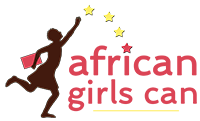Session 2: Advocating for Yourself
Wednesday, July 22, 2020
During the COVID-19 pandemic, schools throughout Uganda have been closed indefinitely. Students are stuck at home, many with no resources at all to stay connected or continue learning. Community Radio is one of the most effective ways of reaching people in rural areas of developing countries. African Girls Can recommended a three-part program to the local radio station, Q-FM, 94.3 in Lira, which was immediately interested in content to provide hope and encouragement to youth, especially girls.
This is the script for the second program. It was broadcast in the local language, Luo, and lasted one hour. Once again, the phones were busy at the show’s conclusion!
Moderator (M), African Girls Can (AGC)
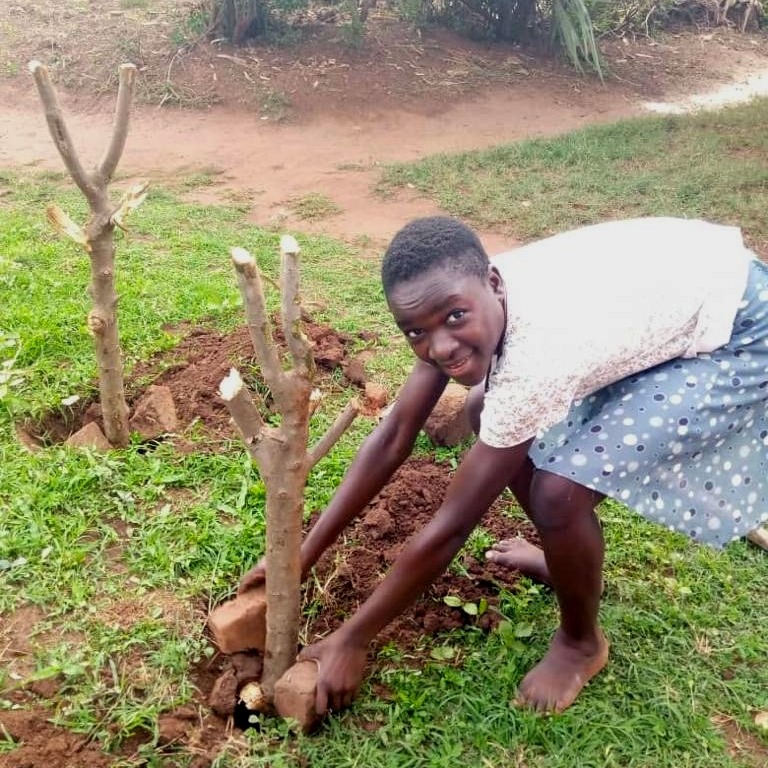
M: Welcome everyone! Joining us again this evening is Madame Jennifer Nyakober, a math teacher and head of the Career and Counseling Department at St. Katherine School. Jennifer represents the organization African Girls Can. With her tonight is Akwang Monica, who is an S3 student at St. Katherine. Monica is one of the students supported by African Girls Can.
Two weeks ago, Madame Jennifer was on this radio station discussing Life Challenges and Becoming Resilient. This time, we are going to talk about what it means to stand up for yourself. We will identify some of the tools you can use to develop confidence in who you are and make sure other people know how special and unique you are.
Please remind us what African Girls Can does.
AGC: African Girls Can was founded in 2016 to promote girls’ education and empowerment. We provide partial scholarships for girls in the Lira area to attend secondary school. These are girls who without this support would have no other opportunity to continue their education. We form a community with these girls and provide activities to help them build their confidence and succeed at school.
M: Let’s get started with tonight’s program.
AGC: We all face everyday challenges in our relationships with people, unexpected events (such as the pandemic!), and difficult choices. It makes life easier when we at least know and recognize our strengths, and can honor the things that are important to us.
We are going to give you an assignment to do after this program. Please get a paper and pencil and list 15 things that make you special. Special can mean anything that makes you stand out from other people in some way. You should think about:
- Your strengths.
- Things you know how to do well (your abilities and skills).
- Things you enjoy doing.
- Things you have done that you are proud of.
- Your talents.
- Important things you have learned.
- Positive things about your personality.
When you are done, think about whether it was easy or difficult to list things that make you special?
M: That seems like a very helpful exercise that can help anyone to build their confidence. Everyone has their own strengths. And I mean everyone.
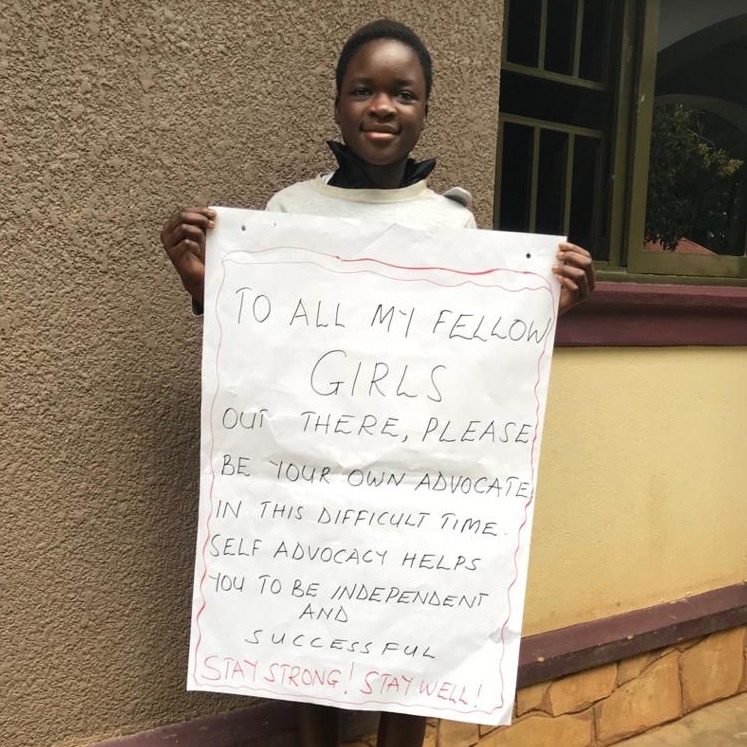 Now, what do the words self-advocacy mean?
Now, what do the words self-advocacy mean?
AGC: Self-advocacy is the ability to tell others what you need and to make good decisions about what supports are necessary to meet those needs.
M: Why is self-advocacy important for students?
AGC: Adolescence is usually the time when students begin to question authority and generally move toward becoming self-determined individuals.
Rather than being dependent on others, it is important that students be given opportunities to establish personal goals and make their own independent choices. This is the way that they will become adults who can make decisions for themselves.
In adulthood, you will be expected to advocate for yourself and take care of your responsibilities.
Learning self-advocacy skills also develops self-determination skills. In other words what do you want to do with your time and your life. This brings about increased personal satisfaction and happiness.
All students, whether or not they are strong academically, have a disability, or face other limiting factors such as poverty, must learn through opportunities and experiences to explore, take risks, learn from consequences, become self-motivated, develop positive self-esteem, and gradually gain control over their own lives.
M: How can someone take steps toward advocating for themselves?
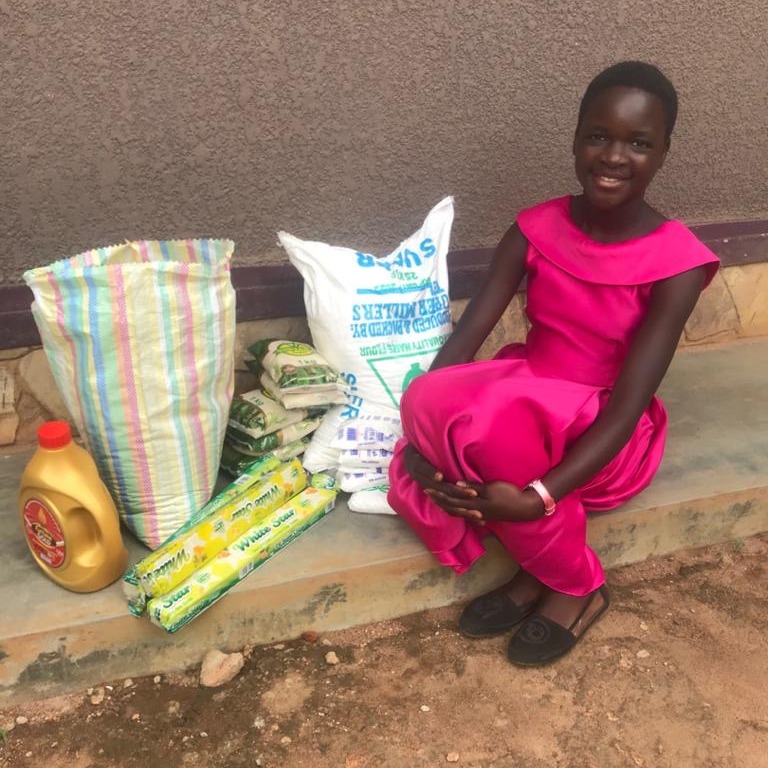
AGC: You may have already done it!
Can you think of an example of a time when you have been an advocate for yourself? Someone, such as your parent or your teacher, may not realize what you need unless you tell them, politely of course. They are not mind readers. But, when reminded (again politely) they will generally remember that they were once your age.
Or have you seen someone else stand up in a way that inspired you? We often can copy the behavior of positive role models.
What’s really important is to be kind to yourself. Be your own best friend. Defend yourself the same way you would defend a friend.
M: It is not common in Uganda for women to speak up for themselves. Why not?
AGC: It is not common because of our culture. Women are supposed to be subordinate and submissive. Everything should be decided for you, whether it is in your best interest or not. The culture has basically kept women in the backyard, never to talk back against injustice. Women and girls in rural areas are particularly affected.
However, we believe change is occurring and organizations like African Girls Can want to help bring about this change. With education and empowerment, we are encouraging girls and women to speak up and fight for their rights.
M: What reasons do girls in particular have to stand up for themselves? I have heard of something called the Global Girls’ Bill of Rights. Can you tell the audience what that is?
AGC: Yes, the Global Girls’ Bill of rights is a declaration of the rights all girls are entitled to. It was written by girls for girls on International Day of the Girl Child last year in 2019 and presented to the United Nations.
These are the ten fundamental rights that ALL girls around the world deserve and should demand:
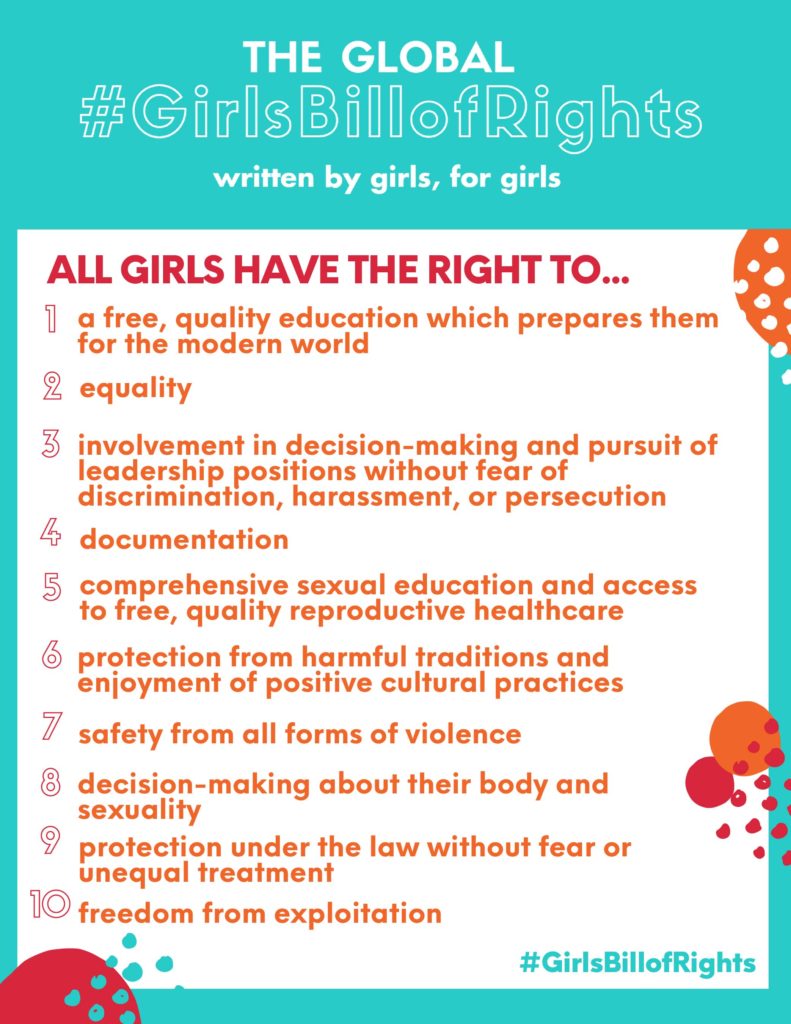
M: We have a problem here with sugar daddies or boda boda drivers preying upon young girls for sex. What can be done about this?
AGC: Abusers tend to make their moves on people who appear weak. The first thing you can do is to stand tall while you walk, your head held high, look people in the eye when you speak, and strongly say “no.” Tell them you have places to be, people to see, people who are waiting for you. Many who are trying to tempt you with money and material things in exchange for sex will then move on to someone who seems more compliant, someone who is an easier target. Don’t let it be you.
M: In order to self-advocate, it helps to know more about our own interests and goals. How do we even know what these are?
AGC: Once again, we are going to recommend an exercise that takes a bit more thought than the time we have on this program. Here are some things to think about that might help you identify your interests. Again, take a piece of paper and make a list of:
- School subjects you like and in which you earn good grades.
- Your personality traits (for example: patient, friendly, talkative, or organized).
- Your physical traits (for example: strong, good with your hands, athletic).
- Extracurricular activities in which you participate (for example: clubs, sports, hobbies).
- Past or present work, church involvement, volunteer activities.
Here are a few other things to consider:
- Do you prefer being inside or outside?
- Do you like to sit, stand, or move around?
- Do you like to work with data (which means numbers or written information), people, or things?
- Do you like to work alone or with others?
- Do you like to work where it is quiet or noisy?
- Are you interested in going to trade school or college to receive additional education beyond secondary?
It is important to think about your abilities realistically. This means to think about yourself and honestly understand what you can do well and what you are not doing well. This will help you to continue to improve your strengths.
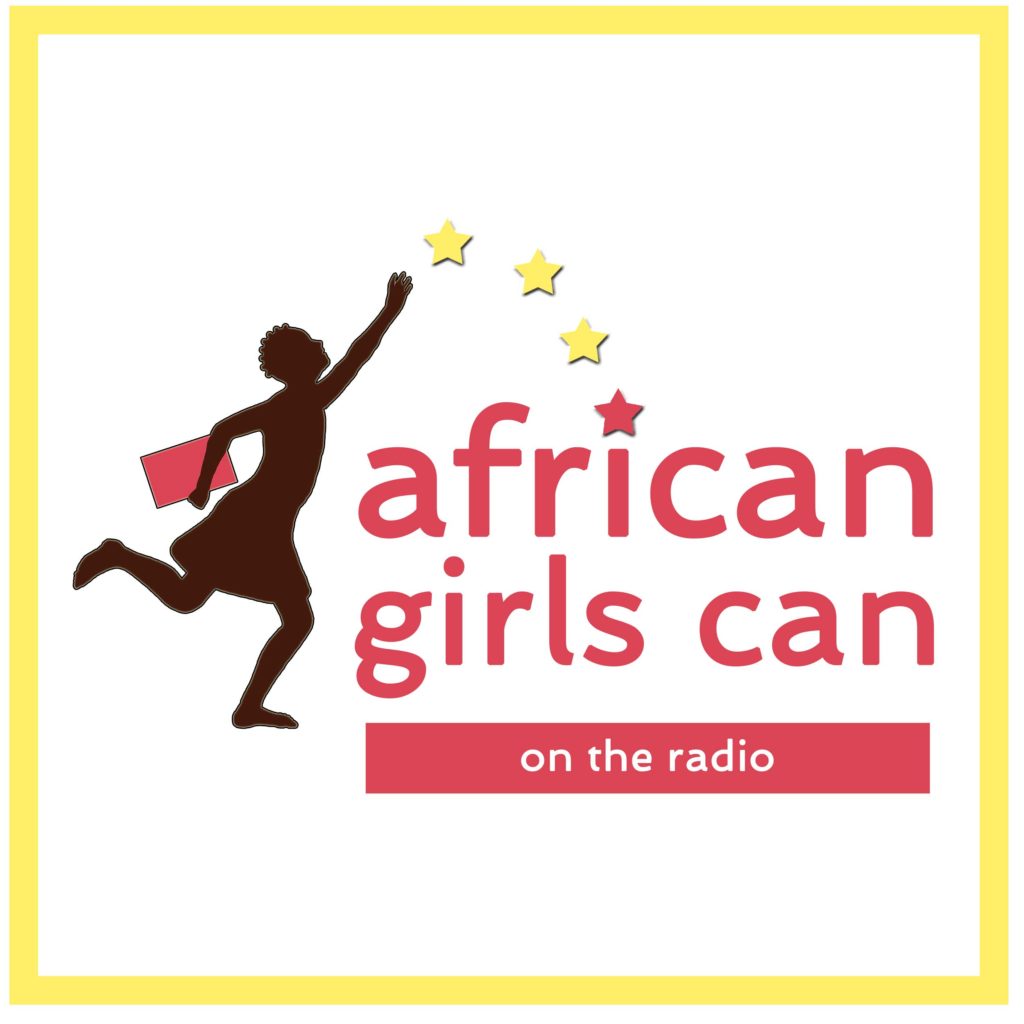 M: Thank you everyone for listening to African Girls Can on the radio and working on advocating for yourself. Tune in again on August 5th when African Girls Can will be presenting about Self-Esteem. Until then, stay strong, stay well, stay hopeful!
M: Thank you everyone for listening to African Girls Can on the radio and working on advocating for yourself. Tune in again on August 5th when African Girls Can will be presenting about Self-Esteem. Until then, stay strong, stay well, stay hopeful!
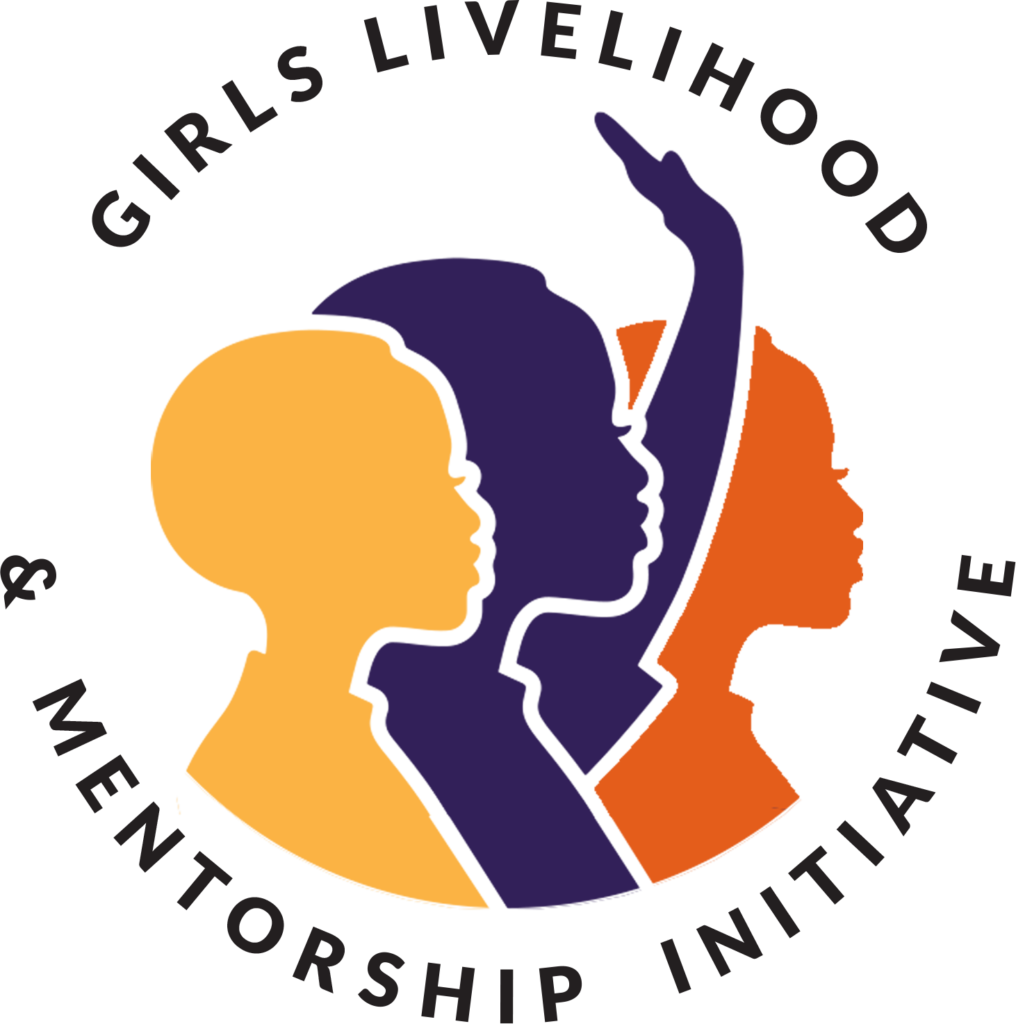 With gratitude to Girls Livelihood and Mentorship Initiative and its Binti Shupavu program for assistance with this content. Binti Shupavu is a four-year life skills course for lower secondary school girls covering topics such as study skills, personal leadership, health and self-confidence with the goal of increasing graduation rates for vulnerable girls.
With gratitude to Girls Livelihood and Mentorship Initiative and its Binti Shupavu program for assistance with this content. Binti Shupavu is a four-year life skills course for lower secondary school girls covering topics such as study skills, personal leadership, health and self-confidence with the goal of increasing graduation rates for vulnerable girls.
